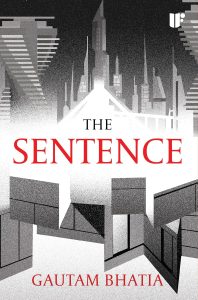The Sentence by Gautam Bhatia: Review by Abigail Nussbaum
 The Sentence, Gautam Bhatia (Westland IF 978-9-36045-152-3, ₹599, 396pp, tp) October 2024.
The Sentence, Gautam Bhatia (Westland IF 978-9-36045-152-3, ₹599, 396pp, tp) October 2024.
A hundred years ago, the city-state of Peruma emerged from a bloody civil war between its landowning elites and its working classes with a legal compromise. A charter that divided the city into High Town, ruled by the corporate-controlled Council, and Low Town, ruled by the anarchistic Commune. In between are the Guardians, an order of lawyers sworn to impartiality so complete that, as part of their training, they leave home for seven years and are forbidden to have any contact with anyone from their past. One of the provisions of the charter was that no part of it could be altered for a century. Now that period is coming to an end, and the courts of Peruma are being asked to reassess the agreement. For the Commune, this is a chance to complete their workers’ revolution; for the Council, the opportunity to crush it.
All of this, however, is happening mostly out of sight of Nila, a seventh-year trainee Guardian, whose disappointment at not being chosen to work on Council vs. Commune is allayed when she’s recruited to a private case by the descendants of Jagat, who a hundred years ago was convicted of murder and sentenced to ‘‘the sleep of death,’’ endless cryogenic suspension. Now Nila must find reasonable doubt in a verdict whose facts are so well-known any child could recite them – because the man Jagat killed was the director of the Council, and the shot that killed him set off the revolution that has resulted in Peruma’s present condition.
Gautam Bhatia is perhaps best known to fans of fantasy and science fiction as the hardworking editor in chief of Strange Horizons magazine, and as the author of two previous works of fiction, The Wall (2020) and The Horizon (2021). In addition to these pursuits, however, Bhatia is a lawyer and a scholar of the Indian constitution, and thus perhaps uniquely aware of how much of the infrastructure of our lives is written down in constitutions and law books and wrangled over in courtrooms. For all that the fantastical genres have spent a great deal of time, in recent years, exploring how societies order themselves (and how that order breaks down), very little attention has been paid to the role of law in the process. In his third novel, The Sentence, Bhatia seeks to address that gap in what feels like a first, a fantasy-world legal thriller.
As Nila wends her way through the surprisingly scant documentation and absolutely voluminous mythmaking around Jagat and the murder of the director, she encounters no shortage of John Grisham-esque flourishes – boardroom shenanigans, shady characters who deliver a crucial piece of evidence, the requisite car chase. The heart of the novel, however, is in debate, in the way that Nila’s explorations of her city’s history and present shed light on, and influence, her legal maneuvering.
Nila – and her trusty roommate and sidekick Maru – discuss both the facts of the case and the merits of their legal strategy. Should she try to impugn long-accepted testimony, or take a purely procedural approach? Should she, as an abolitionist group urges her to do, attack the validity of the sentence of cryogenic suspension itself? (The bitterness with which Nila dismisses the naivety of this suggestion – guaranteed, she says, to produce nothing but bad precedent – feels particularly lived-in.) Inevitably, these discussions end up hinging on the gap between law and ethics, on Peruma’s tangled history, and on realpolitik. When Nila’s superiors try to persuade her to drop the case, they remind her that Guardians rule by consent. A sufficiently provocative ruling, they warn, could bring the entire system down.
These questions come even more to the fore when Nila ventures into the Commune – where she grew up, but from which she is now subtly alienated. The people she encounters espouse the virtues of anarchistic decentralization – the only thing, they insist, preventing the Commune from collapsing like all other revolutions. In less guarded moments, they admit that such social ordering is, practically speaking, impossible, and especially as the strictures of the charter continue to push Low Town towards economic collapse. The folk figure that has coalesced around Jagat – despite, or perhaps because, of the near-total lack of information about the actual man – sometimes seems like the only thing holding the Commune together. When Nila is told this, and reminded of how her case might affect Council vs. Commune, she can only respond that her responsibility is to her client and her case, with no consideration for how they might affect the wider world around them. But even she must acknowledge that this might be an act of moral abdication.
As a talky novel that likes to get into the nitty-gritty of its worldbuilding, The Sentence often arouses the reader’s argumentative impulse. When Nila and Maru discuss the inhumanity of bringing people out of stasis after decades have passed them by, one wonders why they don’t consider the similar inhumanity of a regular prison sentence. When the Communards fervently wish for Jagat’s return, one marvels that none of them seem to have considered that the real man might not live up to their image of him. But perhaps this reaction is one that the novel courts. Jagat’s case turns out to have monumental bearing on the Commune’s origins and its future, leading to a classic SFnal moral dilemma – one that, as Nila admits, only the unknown future will be able to resolve.
In his afterword, Bhatia lists the inspirations that went into the construction of Peruma and Nila’s predicament, which range from the 1871 Paris Commune to the Kobayashi Maru test. This seems fitting for a novel like The Sentence, which so successfully marries old school SFnal approaches with pressing political issues. And here I must apologize to anyone reading this review outside of India, to whom The Sentence is not currently available. It is startling that after three unusual and thought-provoking novels, Bhatia still does not have a US or UK publisher. Let us hope this will soon be rectified, so that readers in those countries, too, will be able to appreciate Bhatia’s unique perspective.
Abigail Nussbaum is a Hugo Award-winning critic and the author of the blog Asking The Wrong Questions. Her writing has appeared in The Guardian, New Scientist, The Los Angeles Review of Books, and Strange Horizons, among others, and she is a regular contributor to the progressive culture and politics blog, Lawyers, Guns and Money.
This review and more like it in the January 2025 issue of Locus.
 While you are here, please take a moment to support Locus with a one-time or recurring donation. We rely on reader donations to keep the magazine and site going, and would like to keep the site paywall free, but WE NEED YOUR FINANCIAL SUPPORT to continue quality coverage of the science fiction and fantasy field.
While you are here, please take a moment to support Locus with a one-time or recurring donation. We rely on reader donations to keep the magazine and site going, and would like to keep the site paywall free, but WE NEED YOUR FINANCIAL SUPPORT to continue quality coverage of the science fiction and fantasy field.
©Locus Magazine. Copyrighted material may not be republished without permission of LSFF.








